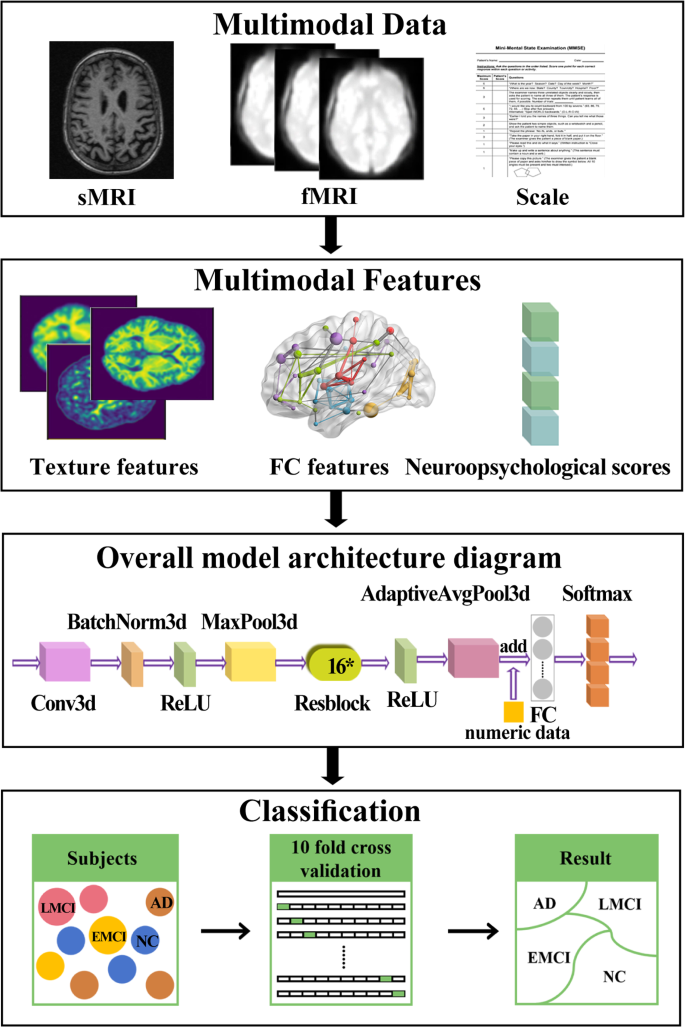Alzheimer’s disease is a devastating neurological condition that affects millions worldwide. Researchers from China and Japan have developed a groundbreaking artificial intelligence (AI) model that can detect the early signs of Alzheimer’s using magnetic resonance imaging (MRI) scans. This innovative approach combines structural, functional, and cognitive data to provide a more comprehensive diagnosis, potentially enabling earlier intervention and improved patient outcomes. By leveraging advanced deep learning techniques, this research offers hope for a future where Alzheimer’s can be identified and managed more effectively. Alzheimer’s disease is a complex neurodegenerative disorder that gradually erodes memory, thinking, and behavior, profoundly impacting the lives of individuals and their loved ones. The race to uncover the early markers of this disease has been a critical focus for researchers worldwide.

Painting a Comprehensive Picture of Brain Changes
In this groundbreaking study, the researchers tackled the challenge of early Alzheimer’s diagnosis by combining multiple modalities of brain imaging data, including structural magnetic resonance imaging (sMRI), functional magnetic resonance imaging (fMRI), and neuropsychological assessments. This multimodal approach provides a more holistic understanding of the complex changes occurring in the brain during the early stages of the disease.
Structural changes: sMRI allows for the detailed examination of brain structures, revealing subtle alterations in regions like the hippocampus and modenetwork’>default mode network, a critical network involved in memory and cognition.
Cognitive assessments: Standardized tests like the DementiaRating’>Clinical Dementia Rating (CDR) provide valuable insights into an individual’s cognitive, emotional, and behavioral functions.
By integrating these diverse data sources, the researchers were able to create a more comprehensive understanding of the brain changes associated with Alzheimer’s disease, laying the foundation for more accurate and earlier diagnoses.

Revolutionizing Alzheimer’s Diagnosis with AI
To harness the power of this multimodal data, the researchers developed an innovative deep learning model called the “Group Self-Calibrated Coordinate Attention Network” (GSCANet). This AI-powered framework leverages advanced techniques, such as group self-calibrated convolution and coordinate attention, to enhance the model’s ability to extract and analyze the complex patterns in the brain imaging data.
Group self-calibrated convolution: This approach allows the model to capture multiscale features by using convolutional kernels of varying sizes within the same layer, expanding the receptive field and improving the recognition of subtle brain changes.
Coordinate attention: This mechanism enables the model to selectively focus on the most critical spatial and channel information, effectively suppressing irrelevant details and improving the classification accuracy.
The combination of these cutting-edge techniques empowers the GSCANet model to effectively identify the early signatures of Alzheimer’s disease, outperforming traditional deep learning architectures in both four-class (Alzheimer’s, early MCI, late MCI, and normal control) and three-class (Alzheimer’s, MCI, and normal control) classification tasks.
Paving the Way for Improved Patient Outcomes
The remarkable performance of the GSCANet model in this study holds significant implications for the future of Alzheimer’s diagnosis and management. By leveraging multimodal data and advanced AI, this approach can potentially enable earlier detection of the disease, allowing for timely interventions and potentially slowing the progression of the condition.
Furthermore, the model’s ability to distinguish between different stages of Alzheimer’s, including the early and late mild cognitive impairment (MCI) stages, provides valuable insights into the disease’s trajectory. This information can aid clinicians in developing personalized treatment plans and monitoring disease progression more effectively.
As the global population continues to age, the burden of Alzheimer’s disease is expected to rise. This research represents a significant step forward in the fight against this devastating condition, offering hope for a future where early diagnosis and targeted interventions can improve the quality of life for individuals and their families affected by Alzheimer’s.
Author credit: This article is based on research by Xiaojie Yu, Jingyuan Liu, Yinping Lu, Shintaro Funahashi, Toshiya Murai, Jinglong Wu, Qi Li, Zhilin Zhang.
For More Related Articles Click Here
